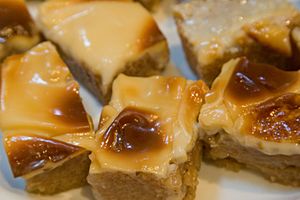Biko (food) facts for kids

Cubed biko topped with a layer of creamy latik
|
|
| Alternative names | "Inkiwar" Sinukmani, Sinukmaneng, Sumang Inilonggo, Wadjit, Wadit, Wagit |
|---|---|
| Course | merienda, Snack |
| Place of origin | Philippines |
| Serving temperature | Warm, room temperature |
| Main ingredients | Glutinous rice, brown sugar, coconut milk |
| Variations | See Kalamay |
| Similar dishes | Yaksik, shwe htamin |
Biko is a yummy sweet treat from the Philippines. It's a type of rice cake made with special sticky rice. People mix it with creamy coconut milk, sweet brown sugar, and a little bit of ginger.
Often, biko is topped with latik. This is a delicious topping made from coconut milk. It can be like crispy coconut bits or a sweet, thick caramel sauce. Biko is similar to another Filipino dessert called kalamay, but the rice grains in biko are kept whole, not ground up. Sometimes, you might even find biko sold as suman, which are often wrapped rice cakes.
Contents
What is Biko?
Biko is a popular dessert or snack in the Philippines. It's known for its chewy texture and sweet, rich flavor. It's often served during special occasions, holidays, or just as a tasty treat any day.
Different Names for Biko
Biko has many names depending on where you are in the Philippines.
- In Northern Luzon, especially among the Ilocano people, it's called inkiwar.
- In the Southern Luzon area, people call it sinukmani or sinukmaneng.
- In the Muslim parts of the Philippines, it has even more names:
- Wadjit in the Tausug language.
- Wadit in the Maranao language.
- Wagit in the Maguindanao language.
Puto Maya: A Special Biko Style
One special type of biko is called puto maya. This version is popular in areas where people speak Cebuano.
How Puto Maya is Made
Puto maya is usually made from purple sticky rice, which is called tapol.
- First, the tapol rice is soaked in water.
- Then, it's drained and steamed for about 30 minutes.
- After that, the steamed rice is mixed with coconut milk, salt, sugar, and ginger juice.
- Finally, this mixture is steamed again for another 25 to 30 minutes.
How to Enjoy Puto Maya
Puto maya is traditionally shaped into small patties. People often eat it very early in the morning with sikwate, which is a rich hot chocolate drink. It's also very common to eat puto maya with fresh, ripe mangoes. Unlike regular biko, which can be quite soft, puto maya is usually a bit firmer, or al dente.
Other Biko Flavors
Biko can also be made with other popular Filipino ingredients to create new flavors and colors.
- Ube-biko: This version uses ube, which is mashed purple yam. It gives the biko a beautiful deep purple color.
- Pandan biko: This type is made with extracts from pandan leaves. It makes the biko a bright green color and gives it a unique, fragrant taste.
 | Kyle Baker |
 | Joseph Yoakum |
 | Laura Wheeler Waring |
 | Henry Ossawa Tanner |

